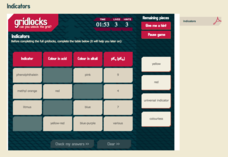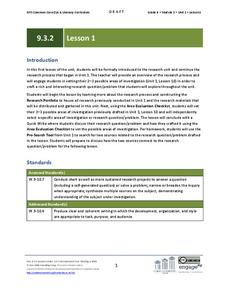NOAA
Biological Oceanographic Investigations – Call to Arms
How many simple machines does it take to make a robotic arm? An inquiry-based lesson explores that topic and challenges pupils to build a robotic arm that can stretch, turn, and more. A few questions help guide them in the right...
Great Books Foundation
Discussion Guide for Little Women
Start with the question in mind with a discussion activity on Louisa May Alcott's Little Women. With four focus questions, note-taking prompts, and discussion points, readers practice answering thematic questions based on textual evidence.
Curated OER
Insect Investigation
Investigation is a brilliant way to spark scientific inquiry. First graders will identify, research, and report what they have learned about a mysterious bug found on the playground. They will use multimedia resources for research and...
C3 Teachers
Economics of Slavery: How Did Cotton Sow the Seeds of Panic?
An inquiry-based lesson challenges high schoolers to research and identify the economic forces and inventions that impacted the cotton industry. Researchers consider how the use of slavery impacted the economic growth of the United States.
C3 Teachers
African American Voices and Reconstruction: What Does It Take To Secure Equality?
High schoolers research the 13th, 14th, and 15th Amendments, as well as other primary source documents, to determine Reconstruction's impact on the North and South. The 34-page inquiry-based lesson includes a staging question and...
Curated OER
The Blue Bottle: An Example of Teacher-Guided Inquiry
Students observe a demonstration in which a bottle containing a colorless solution is mixed, turns blue, then becomes colorless again. They record observations, form and discuss hypotheses, and draw a conclusion based on the evidence.
Curated OER
Acids and Bases: Together again!
Young scholars identify principles behind acid-base reactions. They predict factors that may affect an acid-base reaction. Students identify questions and concepts that guide scientific investigations.
Astronomical Society of the Pacific
Getting Ready for the All American Eclipse!
Give your pupils a front row seat at the biggest light show in the sky this year! In addition to admiring the total solar eclipse, young astronomers can explain the phenomenon with a little help from an inquiry-based instructional...
EngageNY
Grade 9 ELA Module 3, Unit 2, Lesson 6
Having formulated a list of inquiry questions based on a reading of Temple Grandin's Animals in Translation, high schoolers complete a frame tool for their research. They categorize their questions based on preliminary research and trace...
EngageNY
Grade 9 ELA Module 3, Unit 1, Lesson 5
Ninth graders study the study of animals in an informational text lesson plan that focuses on analyzing text structure. As learners continue reading the first chapter of Temple Grandin's Animals in Translation, they form inquiries and...
American Chemical Society
Atoms Can Be Rearranged to Make Different Molecules
Uncover the building blocks of the universe as budding chemists explore atoms and molecules in an exciting inquiry-based activity. Investigators view an interactive video describing the chemical structure of six molecules. Using...
Royal Society of Chemistry
Indicators
How do chemists know what indicator solution is the perfect match for the acid or base they're studying? Discover a rainbow of indicator-related properties with an Internet resource. Individuals relate the indicator solution to its...
EngageNY
Grade 9 ELA Module 3, Unit 2, Lesson 3
Ninth graders hone their research questions in a lesson focusing on accurate search engine techniques. Continuing a unit on inquiry-based learning based on Temple Grandin's Animals in Translation, the lesson guides learners through the...
EngageNY
Grade 9 ELA Module 3, Unit 2, Lesson 7
Now that learners have honed their inquiry-based projects down to their strongest few questions, they can conduct independent research. High schoolers pursue answers to their inquiries while assessing sources, establishing a research...
EngageNY
Grade 9 ELA Module 3, Unit 1, Lesson 1
Clear up the misconceptions about autism and individuals on the autism spectrum with an inquiry-based instructional activity. As ninth graders read the first four pages of Temple Grandin's Animals in Translation: Using the Mysteries of...
EngageNY
Grade 9 ELA Module 3, Unit 2, Lesson 1
High schoolers apply sophisticated research skills to an inquiry-based project connected to Temple Grandin's Animals in Translation. Working from the prior unit and the model areas of investigation, including animal intelligence,...
C3 Teachers
Emancipation: Does It Matter Who Freed the Slaves?
Scholars generally agree on the emancipation of enslaved people in the United States. This inquiry-based lesson asks high schoolers to consider more than the claims of who freed the enslaved people but the significance of the issues...
Pyro Innovations
Beach Exploration
Little ones will absolutely love this lesson. It's all about the beach and what they can find while sifting through the sand. A large bucket of sand filled with hidden items is brought into the classroom. Learners will discuss what kinds...
American Chemical Society
Classifying Objects Based on their Observable Properties
Sorting objects by properties is a lesson in justification. Learners begin by studying different types of properties of materials, including those based on appearance and texture. They examine the properties of specific items and use...
Curated OER
Using Java Applets for Inquiry-Based Physics Lessons
Using Java Applets in the physics classroom can be a great way to reinforce scientific concepts.
Curated OER
The Importance of Making Labs a Priority
The benefits of inquiry-based exploration can be attained in any classroom.
Curated OER
Autism and Autism Spectrum Disorders: Disorders Extending Beyond the "Norm"
Learners develop an understanding of autism by engaging in an inquiry-based discussion. Pupils are exposed to the vast array of defining characteristics of autism spectrum disorders. They create posters about the developmental...
Curated OER
Growing Learners: A Multi-Disciplinary Approach to Investigating Plants and Flowers
Engage young scientists in these inquiry-based lesson ideas to spring into learning about nature.
California Academy of Science
Human Evolution
As the great and hilarious Tim Minchin once said, "Science is simply the word we use to describe a method of organizing our curiosity." Science is more than just a guess; it is based on questions, observations, and evidence. High...
Other popular searches
- Inquiry Based Learning
- Inquiry Based Cell Biology
- Inquiry Based Physics
- Inquiry Based Science
- Inquiry Based Math
- Inquiry Based Language Arts
- Inquiry Based Math
- Inquiry Based Learning
- Inquiry Based Instrumental
- Inquiry Based Learning Maths
- Inquiry Based Science
- Inquiry Based Physics Motion

























